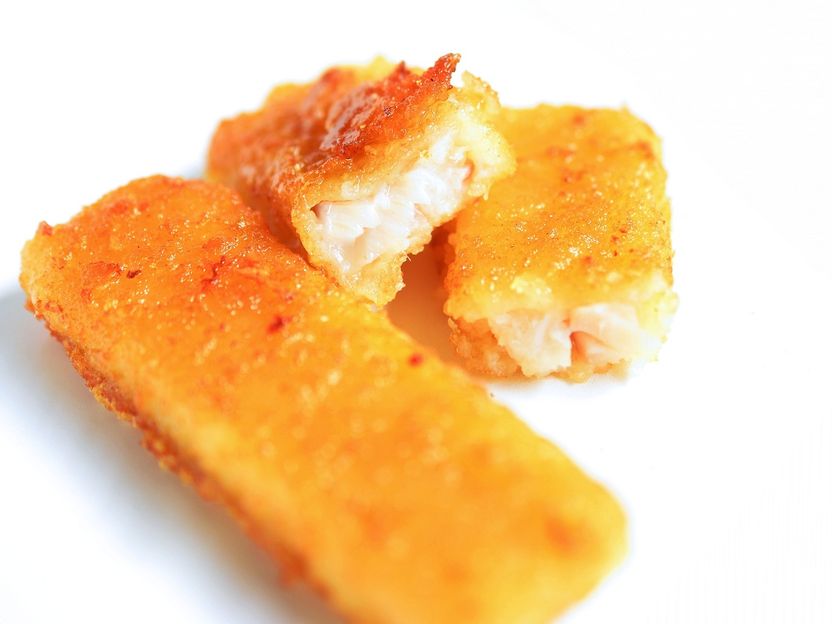WWF fish stick footprint shows: plants are the better fish
Environmental impact of fish sticks nearly four times that of plant-based alternatives
A WWF analysis examines the life cycle assessment of ten fish stick products* and seven plant-based alternatives. Fish sticks are mainly made from Alaskan pollock or occasionally cod, while plant-based ones are made from soy and wheat. The results are clear: the environmental impact of fish sticks exceeds that of the plant-based alternatives by a factor of 3.6. Even when nutritional values are taken into account, plant-based sticks perform better. "Replacing fish sticks with plant-based alternatives brings environmental benefits and is therefore a good way to reduce fish and seafood consumption and thus curb global overfishing of the oceans,"
says Axel Hein, marine expert at WWF Austria. This is imperative to preserve valuable marine ecosystems. After all, overfishing is the main cause of the loss of marine biodiversity. In the last 50 years, the number of overfished stocks worldwide has actually more than tripled from 10 to 35 percent. "Fish and seafood are often seen as a climate-friendlier, healthier alternative to meat. But rising demand has equally serious consequences for the environment and the climate," says Hein.

Bild von congerdesign auf Pixabay
For the WWF study, all processes from the extraction of raw materials to trade were taken into account. Environmental factors such as water resources, energy resources, land use, global warming, air emissions or water pollutants were included. In addition to overfishing, the largest environmental impacts from fish stick production come from greenhouse gas emissions that continue to drive global warming. The emissions come from fishing activities, predominantly from the diesel combustion of fishing vessels. It is true that even with fish-free, plant-based sticks, greenhouse gases are produced by growing and processing the plants. In the case of conventional products (non-organic), additional water pollution from fertilization and pesticide use has a negative impact on the eco-balance. Nevertheless, fish sticks perform significantly worse than the plant-based alternatives in all categories and are several times more harmful to the environment.
The analysis also considered nutritional value, which shows no significant difference when comparing fish and plant sticks. Moreover, because fish sticks are made from lean fish, they are hardly a sufficient source of the omega-3 fatty acids, which are highly praised in terms of health. Conclusion: "For the climate and the environment, as well as for our health, reaching for substitute products is a valuable alternative," says Axel Hein.
In Austria, an average of 8 kg of fish and seafood per capita was consumed in 2021. After salmon, Alaska pollock is the second most popular fish in this country. Worldwide, it is the second most caught fish. "We recommend generally opting for domestic organic fish when consuming fish. In Austria, we also have enough other sources of protein. If we opt for vegetable sticks instead of fish sticks, we are in any case making the better choice for the planet," says Hein. For those who still don't want to give up fish, the WWF Fish Guide offers guidance.
*The analysis examines Swiss products, but the results can be transferred to Austria because the products are very similar.
Note: This article has been translated using a computer system without human intervention. LUMITOS offers these automatic translations to present a wider range of current news. Since this article has been translated with automatic translation, it is possible that it contains errors in vocabulary, syntax or grammar. The original article in German can be found here.
Most read news
Organizations
Other news from the department business & finance

Get the food & beverage industry in your inbox
By submitting this form you agree that LUMITOS AG will send you the newsletter(s) selected above by email. Your data will not be passed on to third parties. Your data will be stored and processed in accordance with our data protection regulations. LUMITOS may contact you by email for the purpose of advertising or market and opinion surveys. You can revoke your consent at any time without giving reasons to LUMITOS AG, Ernst-Augustin-Str. 2, 12489 Berlin, Germany or by e-mail at revoke@lumitos.com with effect for the future. In addition, each email contains a link to unsubscribe from the corresponding newsletter.


























































